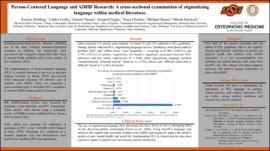| dc.contributor.author | Robling, Kristyn | |
| dc.contributor.author | Cosby, Caitlin | |
| dc.contributor.author | Parent, Gunner | |
| dc.contributor.author | Gajjar, Swapnil | |
| dc.contributor.author | Chesher, Tessa | |
| dc.contributor.author | Baxter, Michael | |
| dc.contributor.author | Hartwell, Micah | |
| dc.date.accessioned | 2023-09-12T16:45:12Z | |
| dc.date.available | 2023-09-12T16:45:12Z | |
| dc.date.issued | 2022-02-18 | |
| dc.identifier | ouhd_Robling_personcenteredlanguage_2022 | |
| dc.identifier.citation | Robling, K., Cosby, C., Parent, G., Gajjar, S., Chesher, T., Baxter, M., & Hartwell, M. (2022, February 18). Person-centered language and ADHD research: A cross-sectional examination of stigmatizing language within medical literature. Poster presented at Research Days at Oklahoma State University Center for Health Sciences, Tulsa, Ok. | |
| dc.identifier.uri | https://hdl.handle.net/11244/339550 | |
| dc.description.abstract | Attention-deficit/hyperactivity disorder (ADHD) is a neurodevelopmental disorder that is frequently found in children. It often goes untreated due to the negative stigma that surrounds the disorder. This stigma is often perpetrated by those in the educational and scientific community. Thus, we conducted a cross-sectional examination to measure the adherence to patient-centered language (PCL) among ADHD-related journal publications. We included a systematic search of PubMed ADHD-related articles (which included MEDLINE) that were published between January 2014 and March 2021. All journals that included at least 20 ADHD-related searches, human research, and were in the English language were included, totaling 5308 articles from 88 journals. These articles were randomized, and the first 500 were selected and screened for inclusion of pre-specified, non-PCL terminology. After exclusion, 311 articles remained. Of these articles, 131 (42.12%) adhered to PCL guidelines. The remaining articles contained stigmatizing language, including phrases such as “problem(s) with [the/a] child or problem child” and “suffers from,” most frequently— occurring in 47.90% (149/311) and 5.79% (18/311) of articles, respectively. There was a significant association between PCL adherence and first author employment (P = 0.04). We found that over half of the current literature on children with ADHD did not adhere to PCL guidelines. PCL is associated with positive health outcomes; therefore, its implementation is recommended by multiple professional groups. It is necessary for the medical and scientific community to adhere to PCL so that stigma surrounding ADHD can be mitigated and support can be readily available. | |
| dc.format | application/pdf | |
| dc.language | en_US | |
| dc.publisher | Oklahoma State University Center for Health Sciences | |
| dc.rights | The author(s) retain the copyright or have the right to deposit the item giving the Oklahoma State University Library a limited, non-exclusive right to share this material in its institutional repository. Contact Digital Resources and Discovery Services at lib-dls@okstate.edu or 405-744-9161 for the permission policy on the use, reproduction or distribution of this material. | |
| dc.title | Person-centered language and ADHD research: a cross-sectional examination of stigmatizing language within medical literature | |
| osu.filename | ouhd_Robling_personcenteredlanguage_2022.pdf | |
| dc.type.genre | Presentation | |
| dc.type.material | Text | |
| dc.subject.keywords | ADHD | |
| dc.subject.keywords | children | |
| dc.subject.keywords | person-centered language | |
| dc.subject.keywords | stigma | |
| dc.subject.keywords | cross-sectional examination | |
